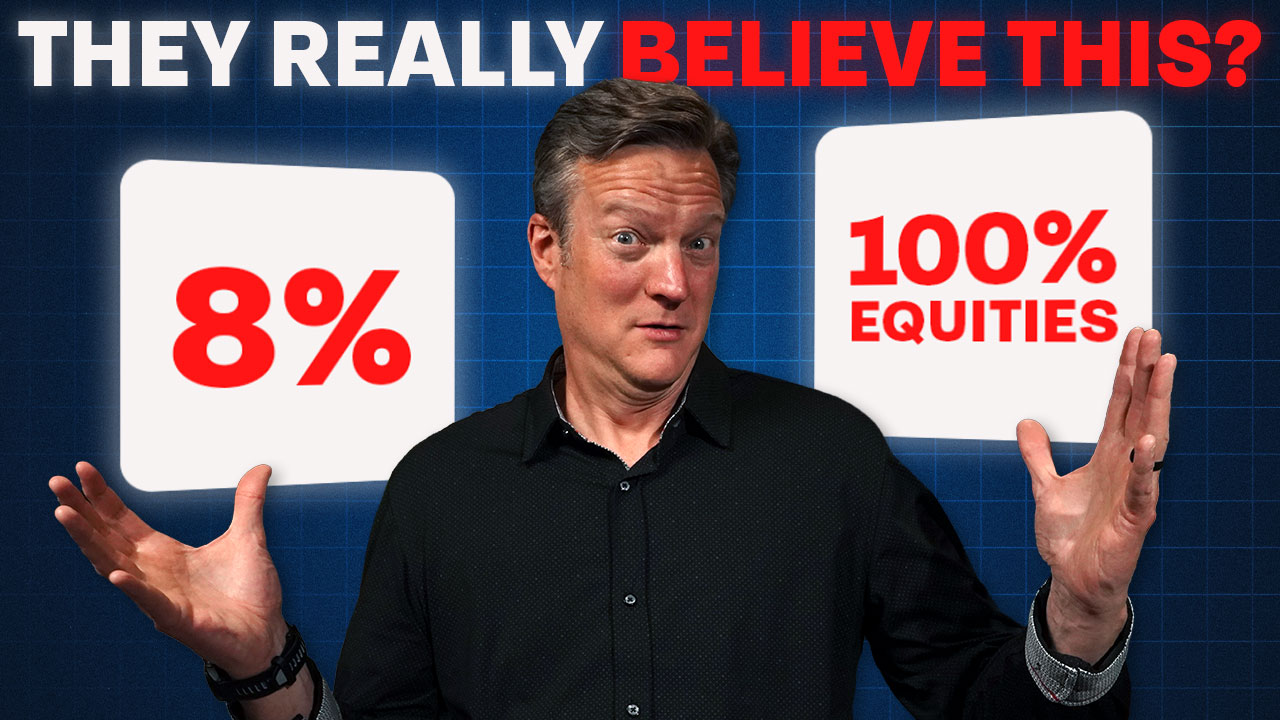Question from Jacob is up next. He says, "I am 32 and just paid off my house worth $315k. Should I refinance and invest the money instead? Wouldn't it be the same as buying a house today and not paying it off early?"
Yeah, so Jake, we get this question all the time. So, one, if you're not subscribed to our stuff, go subscribe. So that way when we answer these kind of questions, you'll kind of get this in your inbox. Don't rent your seat, go ahead and buy your seat, become a subscriber. I think a lot of people, Brian, ask us this question. It's sort of like a gotcha, right? I hear you guys say, 'Don't pay--' Well, I hear half of you guys say, 'Don't pay off your mortgage early,' and the other half says, 'Oh well, you can't. But what if I'm young and I paid it off? Should I go out there and refinance it? Should I go out there and take on more debt?' And I think that you'd be surprised to find that our answer is no. Don't go refinance, don't try to cash out because you're changing the equation. You're changing the risk equation. And I would argue right now, Brian, especially for Jacob, 32, paid off a $315,000 house, let's assume that you have a good income, let's assume that you're saving fine. I think that you're going to be just fine if you're 32 with a paid-off house and you're doing these other things. However, if you think about strictly opportunity and opportunity costs that existed when you paid off that $315,000 home, you are likely paying off debt that was at 2.5%, 2.75%, 3%. If you were to try to go execute this strategy that you're talking about right now, and you had to go refinance, you're probably talking about pulling out money at 5.5%, 6.5%, 7%. That is very different. Those two are not the same. So, I think even with where we are economically right now, I don't think it's quite the same conversation that it probably was two years ago.
No, you just shared the other side of the opportunity cost. But my glass half-full, optimistic side, I'll share that, look, Jacob, I don't want you to go running up a mortgage on it or going and refinancing because real estate transactions have what we call friction costs. Meaning that there's going to be cost to record the new mortgage, there's going to be title insurance, there's going to be all these different things that go on. These friction costs kind of make it where, no, you're in. So, you paid off the house, congratulations, the house is paid for. Yes, maybe you left some money on opportunity costs of what that money could have turned into. But now that you've crossed that threshold, you're debt-free on that mortgage. So let's talk about that in the fact that I get frustrated with 30-somethings that are paying off their mortgage because I'm more worried about the risk of you not building wealth because you're not. Remember, there are two components to wealth construction. There's building wealth, and then there's staying well. You did the staying wealthy component while you were in your early 30s, when I would argue that that should have happened post-45 because that's when you really have to worry.
But since you've paid it off, you've actually crossed the big risk threshold that I worry about, because there are a lot of people that I think get this design desire to pay off their mortgages, but they go wide open into it. But I always tell them, 'You really haven't trimmed the risk or created the cash flow opportunity for your household until you've 100 percent paid it off.' Because if you lost your job while you still owed ten thousand dollars on the three hundred thousand dollar mortgage, more than likely you're going to have a hard time going and refinancing without a mortgage - I mean, without a job. Um, you're going to the sharks, the sharks are going to start swimming laps around you because they're like, 'Man, we got them, you know, we got this house of this juicy asset has very little debt but they don't have the cash flow to actually pay the debt.' Man, this is the opportunity for the banks and others to take advantage of your lack of liquidity. But you actually made it on the other side, you actually fully paid off the house.
So, you are now experiencing the cash flow benefit of you don't have to pay a mortgage payment anymore. So, I'd say turn that frown upside down and let's actually use 100 percent of what would have been going to your mortgage - you know, sans the insurance and the property taxes - and actually start throwing that into the wealth-building process. Because you did make it to where you fully paid off the house. It's always the people who I'm worried about, you losing your job or having a medical emergency or something when you need access to assets, but in real estate, it's very illiquid. And you can't do it. You made it through that Gauntlet, so that's to be celebrated.
So let's now turn that positive into a double positive. Let's essentially put another stack on your checkers here and actually start working compounding growth by hyper-saving. Yeah, the beautiful thing is you're 32 years old. Brian was very kind about it. I'm going to flip it around and be a little more stern. If you spend all that time paying down the debt, now you got to go make up for lost time. Here's what I want you to do, Jacob. I want you to go to moneyguy.com resources and download our wealth multiplier. Let's put that in the chat so he has like a really easy way to grab that because what I want you to see is what every dollar for you at 32 years old can turn into by the time that you get to 65. And it's still really, really exciting. It's not 88 times over exciting, but it's still really, really exciting. But because you weren't building those dollars in your 20s when you had those 60s, 70s, 80s multiplier, you got to get really, really serious about making up for lost time. But it's still possible. There are a number of paths to wealth, and you just chose to go the debt-free path. Now you've got to go just what Brian talked about, the asset-building accumulation path. I do think one last final note. What if Jacob was already saving 25 percent and then also still paid it off because he's young, and there's a way that you can risk mitigate and you did it. Okay, now you didn't maximize every dollar, but who cares? Once you're already checking the boxes on the
Financial Order of Operations, good for you, Jacob. That's another opportunity where maybe the financial mutant already made it to step nine at age 32, and it was a clear opportunity.











